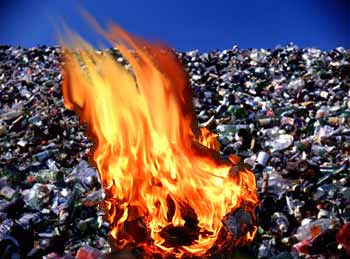 Plastics: Your Formidable Enemy
Plastics: Your Formidable Enemyby Jan Lundberg
Imagine the near future without petroleum, as we try to sustain ourselves and do things in a more natural or austere way. Such as, no plastic hoses replaceable for watering gardens – just when we'll have to do more local gardening for a post-petroleum food supply.
If this were not a serious enough challenge, it turns out that plastics are full of poisons that kill living things including people. Think of it as a permanent, toxic oil spill. The dangers of plastics have been ignored and suppressed for decades, but the recent news on the extent that plastics are killing sea animals and birds will finally raise the human health issue through the environmental focus.
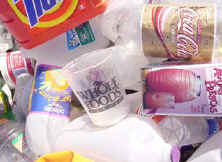 As the danger of the plastics plague may not sink in for years, many people pondering the future today will still mentally cling to their plastic-dependent lifestyles and the perpetuation of the modern industrial economy that relies on myriad forms of petroleum. As we will see in this report, alternative plant-based plastics are not going to do the trick for the world economy. Recycling plastics, as we also learn, is also not very feasible.
As the danger of the plastics plague may not sink in for years, many people pondering the future today will still mentally cling to their plastic-dependent lifestyles and the perpetuation of the modern industrial economy that relies on myriad forms of petroleum. As we will see in this report, alternative plant-based plastics are not going to do the trick for the world economy. Recycling plastics, as we also learn, is also not very feasible.
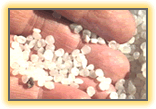 "About 250 billion pounds of raw plastic pellets are produced annually worldwide and turned into a tremendous variety of products, from cars and computers to packaging and pens." (Wired News, June 5, 2004). People think of oil mainly as the strategic fuel for their cars, and some Americans justify a foreign policy that kills for oil. If they knew how dependent they were on massive amounts of plastic from oil and natural gas for other basic modern products, the war cry could be louder. However, health-worries during the rising cancer epidemic could counter the demand for endless plastic.
"About 250 billion pounds of raw plastic pellets are produced annually worldwide and turned into a tremendous variety of products, from cars and computers to packaging and pens." (Wired News, June 5, 2004). People think of oil mainly as the strategic fuel for their cars, and some Americans justify a foreign policy that kills for oil. If they knew how dependent they were on massive amounts of plastic from oil and natural gas for other basic modern products, the war cry could be louder. However, health-worries during the rising cancer epidemic could counter the demand for endless plastic.
Plastics, cheap energy, clean drinking water and almost all other key resources are about to become sharply limited. This limitation, brought about by the world's growing population rapidly depleting resources, is a defining aspect of our civilization running up against an immovable wall.
This report draws upon this writer's personal knowledge from his days working for the petroleum industry and then as a defender of the Earth. I've been fortunate to meet leaders such as Captain Charles Moore, who more than anyone worldwide has broken the story on the tragic pollution of the seas caused by plastics. A major news report on plastics as an environmental hazard (from Scripps Howard newspaper service, July 20), was a groundbreaker. By itself it did not put the "plague of plastics" into daily public discourse; we have a long way to go. However, that article said absolutely nothing about the serious effect on public health from plastics. There is plenty of evidence.
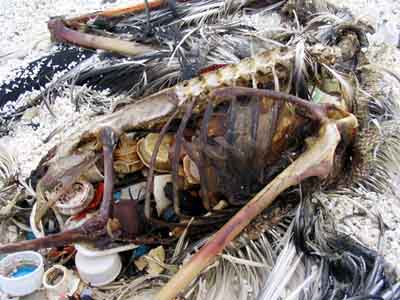 When the full impact of plastics dawns on vocal mainstream people, it could become bigger than the concern over Genetically Modified Organisms currently being slipped into our food and unleashed into nature. People don't realize the biotech industry works hand-in-glove with the petroleum industry. For example, Monsanto is a petrochemical company. They want to control seeds so that farmers will have to buy their herbicides; a pesticide-resistant GMO-crop can have its field get dowsed with profitable poisons that will kill all other organisms such as "weeds." (New York Times, my letter to the editor of Feb. 13, 2002, "Raising Pure Food"). Food, plastics, petroleum and biotech are intertwined and need to be examined in a new light.
When the full impact of plastics dawns on vocal mainstream people, it could become bigger than the concern over Genetically Modified Organisms currently being slipped into our food and unleashed into nature. People don't realize the biotech industry works hand-in-glove with the petroleum industry. For example, Monsanto is a petrochemical company. They want to control seeds so that farmers will have to buy their herbicides; a pesticide-resistant GMO-crop can have its field get dowsed with profitable poisons that will kill all other organisms such as "weeds." (New York Times, my letter to the editor of Feb. 13, 2002, "Raising Pure Food"). Food, plastics, petroleum and biotech are intertwined and need to be examined in a new light.
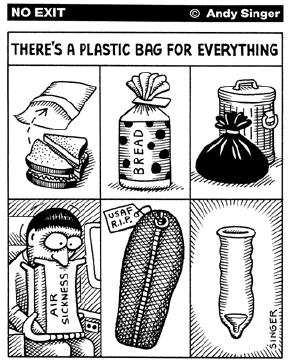 Other links
Other links
War on Plastics by Jan Lundberg
Plastics Additives by Jan Lundberg
www.ourstolenfuture.org
Plastic Oceans news article from Wired News, and more.
Algalita Marine Research Foundation, maker of the movie, "Our Synthetic Sea" available for purchase.
Earth Resource Foundation's "Sea Turtles Don't Shop" anti-plastic bag campaign.
Paul Goettlich's Get Plastic Out of Your Diet
and his
PVC: A Health Hazard From Production through Disposal
Scientific American article on "green plastics"
Sustainable business: reuseablebags.com
Scripps Howard plastics article in Seattle daily newspaper.
"Paper or plastic?" Why the kill-for-oil culture will collapse and 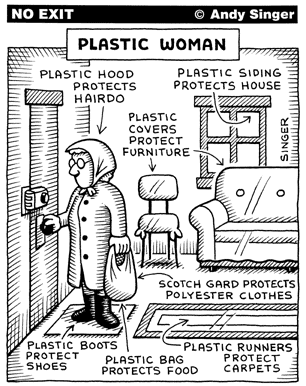 die.
die.
Trash society, trash fashion, trash worship.
"Plastic disaster is creeping on me..." - the Depavers song Green is the Shelter
Funding link below for CAPP:
Donate to the Campaign Against the Plastics Plague (tax deductible; sponsored by the Earth Resource Foundation) to help us help you and the countless creatures harmed by petroleum/plastics. Thank you.
To support Culture Change/Sustainable Energy Institute and its projects, make a tax-deductible donation.

Great article. I've been working towards a plastic-free life and blogging about it at Fake Plastic Fish for over a year. Of all the plastic-free alternatives I've found, replacements for plastic used in gardening has been a problem. You present the problems of plastic beautifully. I wonder if you have found solutions that you could share.
ReplyDeleteThanks! I found your blog through a Google alert for "plastic."
Beth